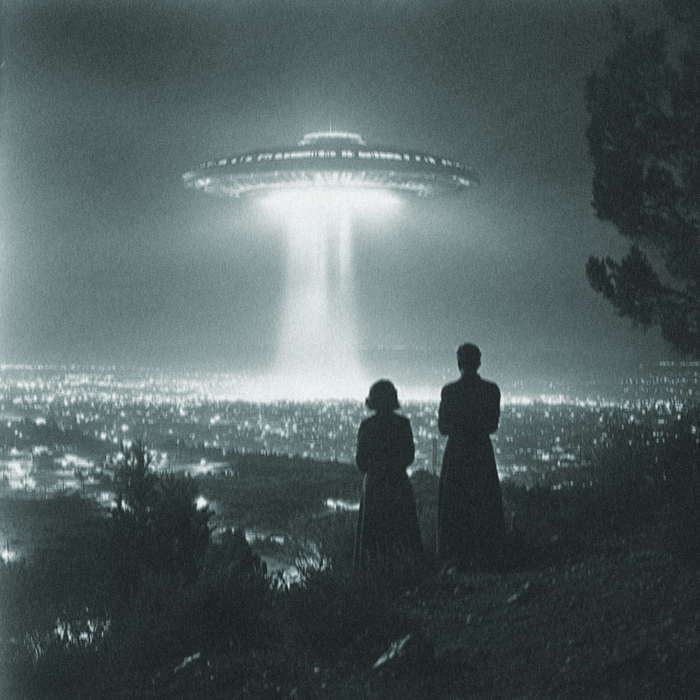Goodbye Our Darling UFOs: A Farewell to Our Beautiful Delusion
Friday • August 29th 2025 • 4:35:08 pm
Today we bid farewell not to visitors from distant stars, but to something perhaps more profound—an idea that has illuminated the depths of human psychology, the power of belief, and the extraordinary ordinariness of our pale blue dot.
The UFOs—those shimmering discs of possibility that danced through our collective imagination—have taught us more about ourselves than any alien anthropologist ever could. They showed us how religions are born in the fertile ground where fear meets wonder, where the unexplained meets the desperate need to explain. We watched as ordinary people became prophets, as misidentified weather balloons became harbingers of cosmic communion, as sleep paralysis transformed sufferers into chosen contactees.
What a magnificent laboratory these phenomena provided! Through them, we witnessed the birth of modern religions—how a charismatic leader's hallucination, perhaps sparked by ergot poisoning or temporal lobe epilepsy, could blossom into elaborate cosmologies. We observed how economic desperation could make selling salvation more profitable than selling insurance. We documented how poor education left minds vulnerable to the simplest logical fallacies, how hysteria could spread through communities like wildfire, and how the terrifying experience of sleep paralysis could convince someone they'd been chosen for cosmic experiments.
And always—always—there was an explanation rooted in the beautiful strangeness of Earth itself. Those mysterious lights? Atmospheric plasma phenomena, ball lightning, temperature inversions creating mirages that would make any desert jealous. Those impossible movements? The human eye's saccadic masking playing tricks, or Venus dancing in the atmosphere's lens. Those government cover-ups? Yes, there were cover-ups—of experimental aircraft, of Cold War paranoia, of military embarrassments. But never, not once, did we need to invoke visitors from Zeta Reticuli to explain what we observed.
The Earth, you see, is strange enough. We live on a sphere of molten rock covered by a thin film of water and gas, hurtling through space while harboring self-replicating molecules that became conscious enough to contemplate their own existence. Is that not wild enough? Must we really add flying saucers to make it interesting?
Here's what breaks my heart and fills it simultaneously: Every person who spent nights scanning the skies for UFOs had the right instinct—to look up, to wonder, to refuse to accept that what we see is all there is. But imagine if that same passion were directed toward understanding the actual cosmos! The real universe is so much grander than any UFO mythology could ever be.
In the time you've been listening to these sad words, light from distant galaxies has traveled millions of miles to reach your eyes. Right now, there are storms on Jupiter larger than Earth, diamonds raining on Neptune, and geysers erupting from the ice moons of Saturn. And we just now discovered fat little moons orbiting Uranus. There are pulsars spinning hundreds of times per second, black holes warping spacetime into cosmic pretzels, and somewhere—probably many somewheres—molecules are taking their first tentative steps toward life.
Science—real science—doesn't diminish the mystery; it deepens it. Every question we answer reveals ten more we hadn't even known to ask. We don't need false mysteries when the real ones are so much more intoxicating. The quantum world isn't just stranger than we imagine; it's stranger than we can imagine. And yet, with mathematics and experimentation, we can grasp pieces of it, hold them up to the light, and say, "Look what we found!"
Come to science. Not because it has all the answers—it doesn't. Not because it's easy—it isn't. But because it's the only tool we've ever developed that can reliably separate what we wish were true from what actually is true.
We need you. Humanity needs you. We face challenges that no amount of wishful thinking about benevolent space brothers can solve. Climate change won't be reversed by crystal healing. Pandemics won't be stopped by conspiracy theories. The asteroids that will eventually threaten Earth won't be deflected by positive thinking. Only science—collaborative, careful, sometimes mistaken but always self-correcting science—can carry us forward.
The UFO believers were right about one crucial thing: We are not alone. Not because aliens are visiting Earth, but because the universe is vast beyond comprehension, and the probability of life elsewhere approaches certainty. When we do make contact—and I believe we will—it won't be through blurry photographs and abduction tales. It will be through radio telescopes detecting purposeful signals, through spectroscopic analysis revealing biosignatures in exoplanet atmospheres, through the patient work of scientists who chose reality over fantasy.
So goodbye, beautiful UFOs. Thank you for the dreams you inspired, the conversations you started, the wonder you kindled. But now it's time to grow up. The universe is calling, and it's so much more magnificent than flying saucers. It's time to answer that call with science, with reason, and with the courage to face the cosmos as it truly is—vast, mostly empty, often hostile, but punctuated by islands of such beauty and complexity that they make every fantasy pale in comparison.
The stars are waiting. Let's go meet them—not as gullible children waiting for space parents to save us, but as a species mature enough to save itself, wise enough to seek truth over comfort, and brave enough to face the extraordinary reality of our ordinary, spectacular world.
Welcome to science. Welcome to the real cosmic adventure.
